As the medical cannabis industry has grown since 2016, so has the product range. There are currently over 150 branded medical cannabis products on the market. These products are applied for and prescribed via the Special Access Scheme (SAS) or Authorised Prescriber (AP) cannabis access pathways.
We’re now also seeing a lot of compounded products entering the market. Recently, many of the clinics have decided to prescribe compounded oils to patients rather than branded (SAS or AP pathway) medical cannabis products.
Compounded medications can be created and prescribed by any doctor and do not go through one of the TGA access pathways. On face value, this may sound great for patients and doctors. However, prior to accepting a script for a compounded product, it’s important you understand what they are, why the framework exists and why your doctor may be prescribing them.
In this article, we’ll explain what patients need to know about compounded products before speaking with their doctors. Here’s what the article covers:
- Branded vs compounded medical cannabis products
- When the compounding process should be used (infographic)
- How and why it is being used (Important)
- Why you should question compounded medication if prescribed
- The questions to ask your doctor about compounded medication
Branded vs compounded medical cannabis products
Branded products
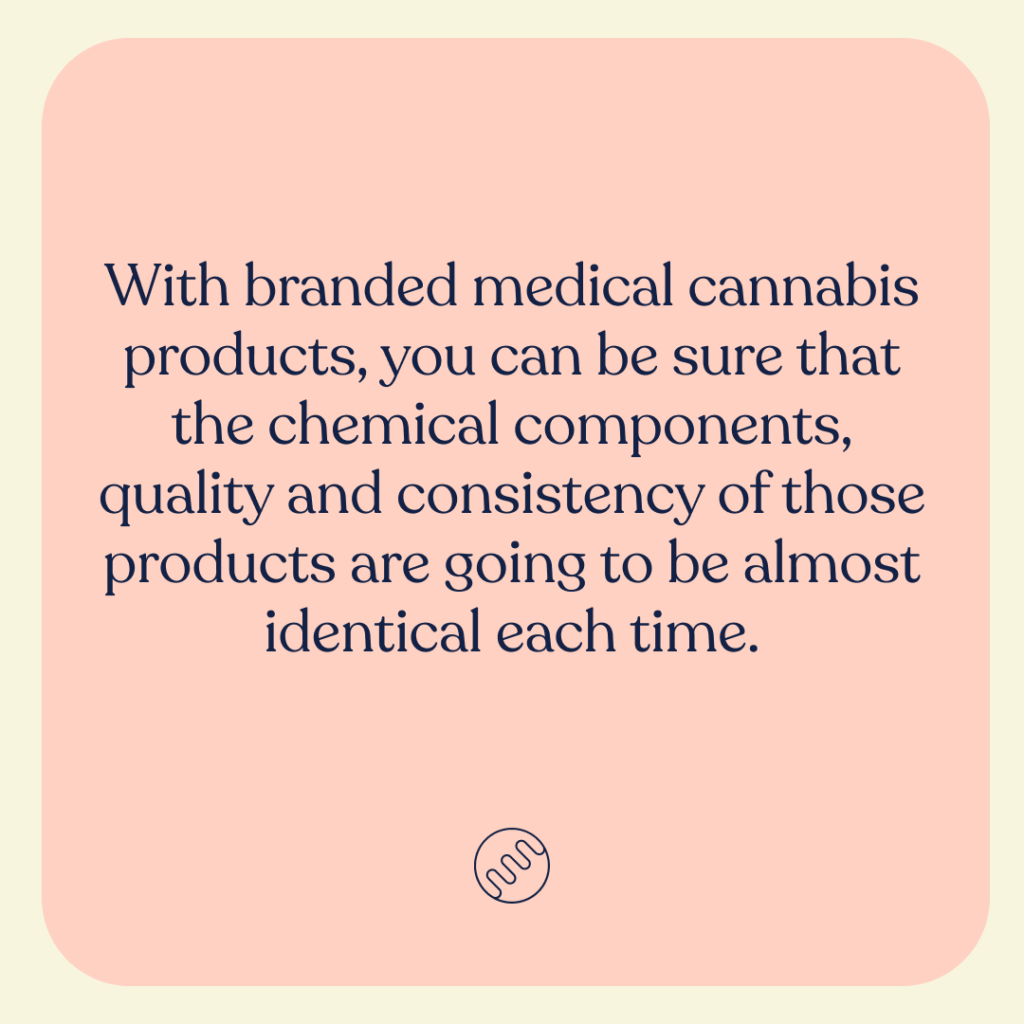
Branded medical cannabis products are products that are supplied by a medical cannabis company that’s a licensed supplier. These products are prescribed to patients once the patient is approved by the TGA. Suppliers may have a range of products which are local, imported or some combination of the two.
The TGA regulates the prescription of these products. And, the regulatory bodies audit these companies and test the products and product batches from time to time.
The TGA requirements for branded products do allow for some variation from batch to batch of each product, but that variance threshold is relatively low. So, when you get a branded product, you can be sure that the chemical components, quality and consistency of those products are going to be similar each time.
However, as we pointed out in our local vs imported cannabis article, the branded products that are imported often don’t get enough oversight (which is one of the reasons the TGA is talking about making all products meet GMP standards).
Finally, with regard to branded products, doctors will need to apply to prescribe your medication via the TGA’s SAS or AP scheme. The TGA keeps track of these prescriptions and applications and uses this data for changing or improving the access scheme.
Finally, with regard to branded products, doctors will need to apply to prescribe your medication via the TGA’s SAS or AP scheme. The TGA keeps track of these prescriptions and applications and uses this data for changing or improving the access scheme.
One of the most critical aspects of the branded products, however, is that if you run into problems with the product (i.e. quality or contamination), you can report these problems to the TGA. Your reports not only help you get support, but they also help the TGA to regulate suppliers and improve the access scheme.
Compounded products
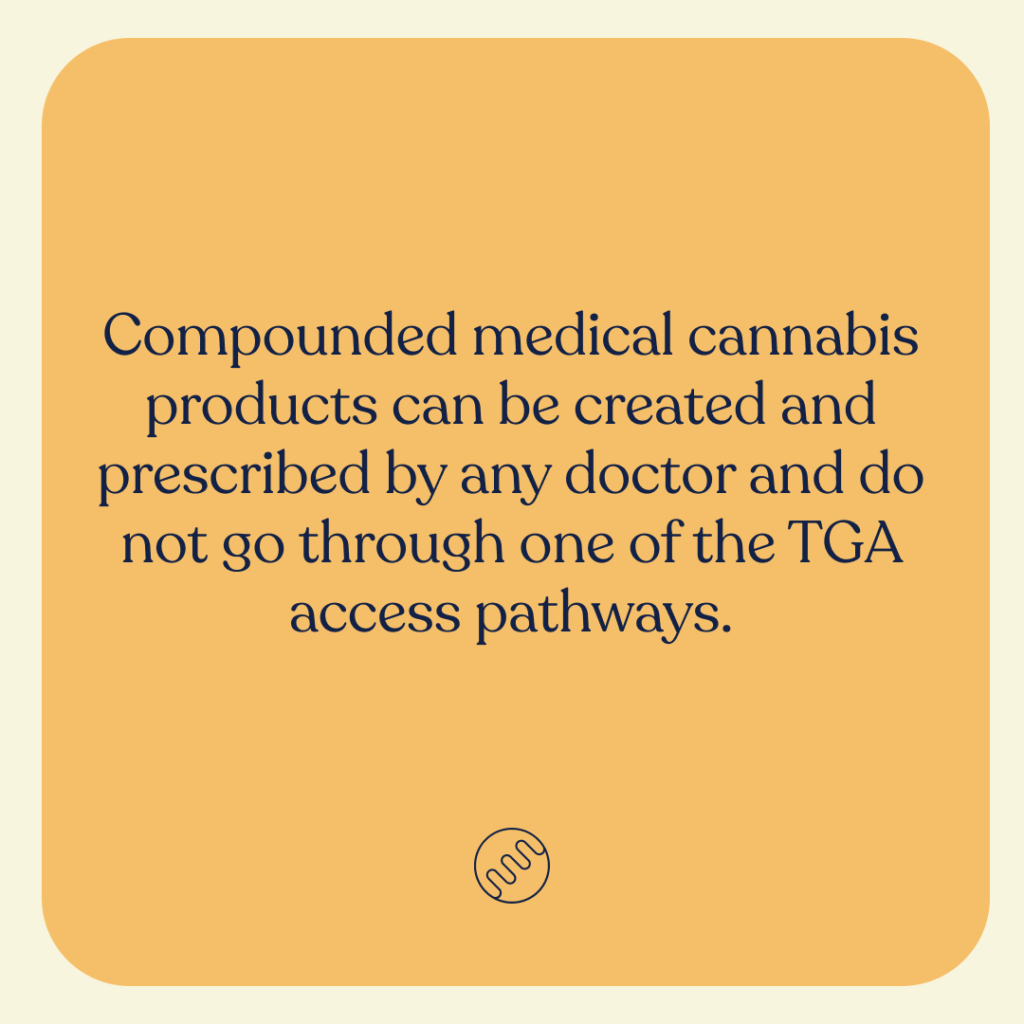
Compounded products are different. The components of compounded products are required to meet the same standards as branded SAS or AP products. In fact, compounding pharmacies are required to meet a high set of standards set out by the Pharmacy Board of Australia. So, in theory, compounded products should be the same quality as the branded products.
If we were to make a direct comparison between compounded and branded products, we’d say that compounded products are more like imported, branded products. Oversight is lower. And, there are a few other differences between compounded and branded products.
Compounded products are meant to be created when the script is received, not in batches. Creating these products in batches is not allowed by the Pharmacy Board. However, it will be almost impossible for a patient to know if this is happening.
Testing of a final compounded product is rare. The only testing that could be done on the final product would be by the pharmacist themselves, if they decide to do so. While compounding pharmacies must meet certain quality standards, the final products aren’t tested for stability (shelf life), consistency from batch to batch, cross contamination or have any sort of microbial testing.
Similar to imported products in final form that haven’t been produced in a GMP facility, it’s impossible to know that the product doesn’t contain expired stock, goods that have been recalled from other markets, or that they have stability data relevant for the Australian climate, etc
These products will almost always cost less from seed to patient due to the differing regulatory requirements. And, because they don’t require a TGA approval, there’s much less work for the doctor to prescribe. While that sounds great, these price savings often aren’t passed on to the patient (see more below). So, you’re getting a riskier product for the same price.
While you can go to the TGA for adverse events with compounded products, they do not regulate the products themselves so they can’t help you with a product defect or if you somehow found out the product doesn’t contain what’s on the label.
Finally, in looking into health insurance companies covering medical cannabis, most of the companies said that the products had to be TGA approved via the SAS or AP program. While we’ve heard that some insurance companies cover compounded products, we cannot provide evidence of this.
To be clear, there is a place for compounding in medical cannabis and we are not saying that all compounded products are bad and that you should never accept one. What we are saying is that you should understand the difference between a branded product and compounded product. Then you can make a decision as to whether the products you’re being prescribed are right for you.
When the compounding process “should” be used
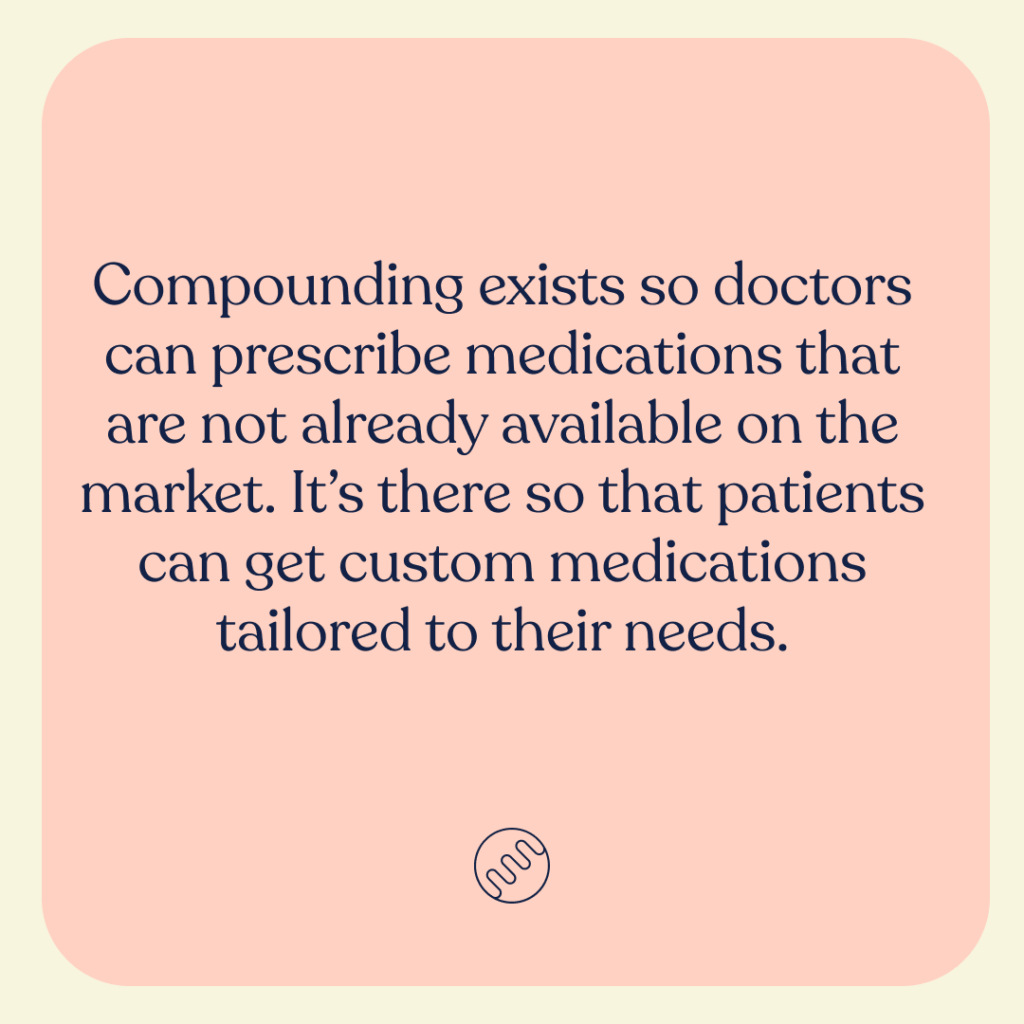
There are many reasons that the compounding process exists from a pharmaceuticals standpoint. But, we’re going to explain the main reason that it should be used from a medical cannabis perspective.
Compounded products are created to meet unmet clinical needs. They are not meant to replace approved (ARTG listed) medications. Because cannabis isn’t ARTG listed, they can replace cannabis medications. But, why would a doctor do this?
Branded product suppliers and manufacturers have put countless hours and money into creating those products. Branded, SAS or AP products have been created to meet medical cannabis patient’s clinical needs. While there are only two clinically proven products, Sativex and Eipdyolex, a branded product should meet your needs just as well as a compounded product, unless that product is custom made for you.
So, while not against the rules, doctors shouldn’t be compounding medical cannabis products that already exist. Compounded products that are similar to or the same as branded products are not more beneficial to the patient, are not being ‘created to meet an unmet clinical need’ and they are having a negative impact on growth of the industry long term.
Here are some cases when we think compounding should be used.
For example, if a doctor believes that you need a specific ratio of CBD to THC or a unique blend of cannabinoids and terpenes, and a product doesn’t already exist in a branded product, the doctor can prescribe you precisely what they believe you need.
Another example is when the branded oil you were last prescribed is now out of stock. Your doctor may want to make sure they get a product that’s as close as possible to your old product and could have the product made up specially for you.
Or, finally, perhaps you have a sensitivity to the various carrier oils that branded products have. A product with a carrier oil and unique blend of cannabinoid compounded could be created specifically for you.
There are very few other circumstances when a doctor should be compounding a product. Again, compounding products isn’t bad – it’s not the best choice for patients or industry, with limited exceptions.
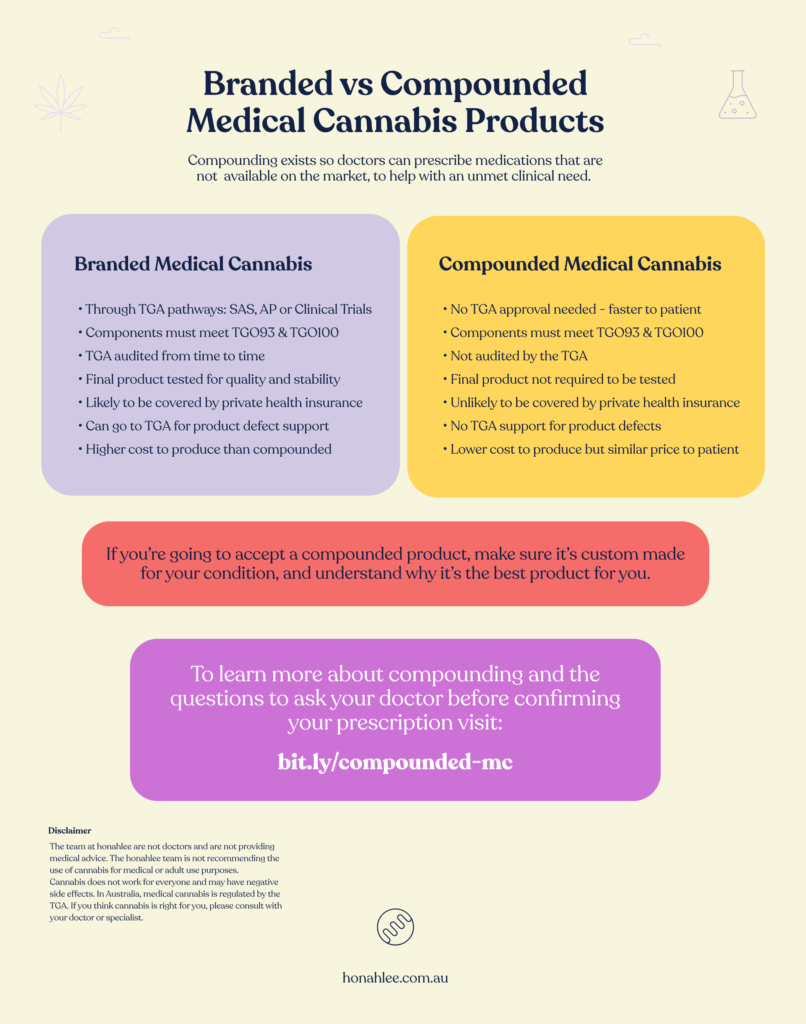
How and why it is being used (Important)
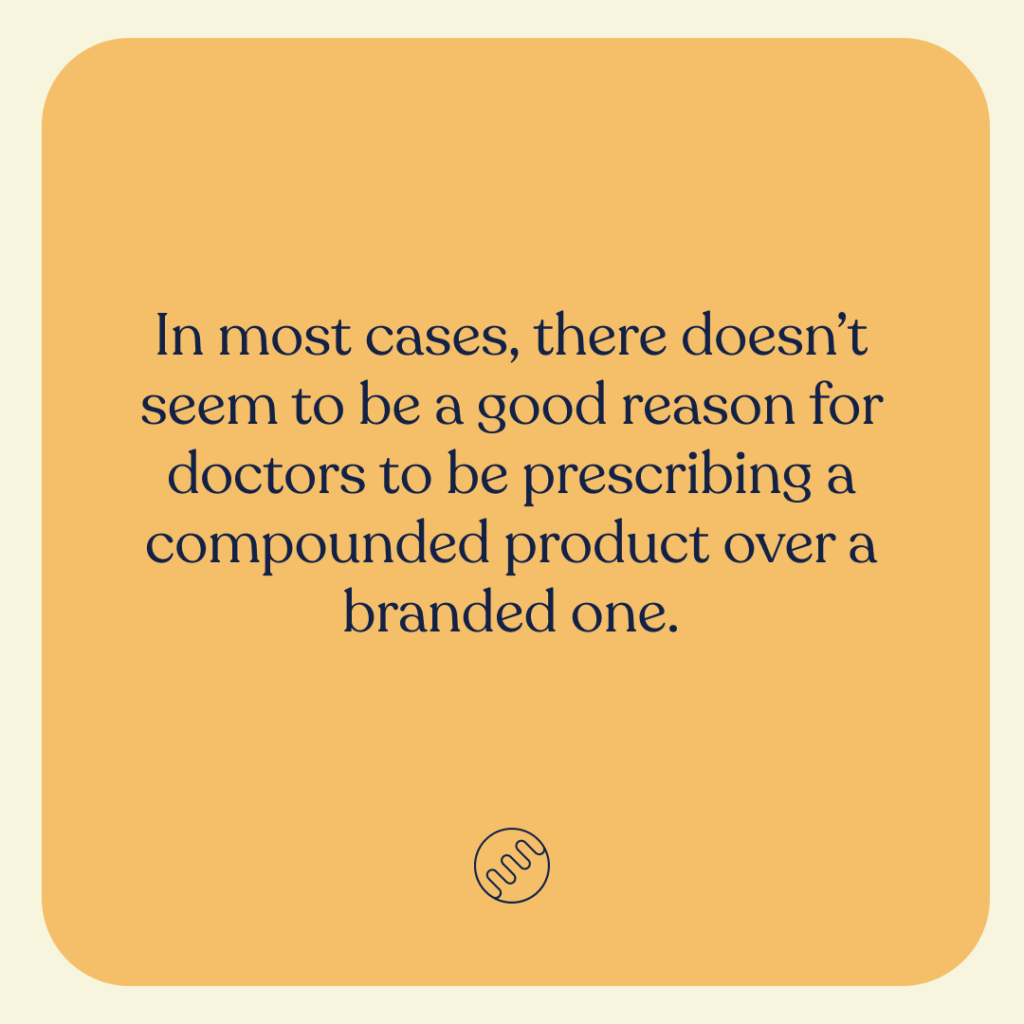
Compounding is used on a regular basis. Clinics in particular are increasingly prescribing compounded products to patients. The problem is that in most cases, there doesn’t seem to be a good reason for doctors to be prescribing a compounded product over a branded one.
We’ve heard of doctors telling patients that all other products have low stock. Doctors have said that these are better products. We’ve also heard of patients being told that branded products take longer. While the statement about these products taking longer is true, it’s only a couple of days more, so again, this isn’t a valid reason.
Doctors are also telling patients that they can only take their script to the pharmacy the doctor/clinic has selected. While in some cases other compounding pharmacies may not have the raw materials, it’s the patient’s right to choose the pharmacy where they fill their script.
None of the reasons listed above are specific to patient efficacy, custom medications for patients or general patient well-being.
We’re also going to take an educated guess as to why compounded products have become all the rage; Doctors and clinics make more money from compounded products.
Doctors don’t need to put in an application to the TGA for compounded products, so they save time. These products often already cost less because the raw materials don’t go through the same processes and requirements as branded products. And, certain doctors and clinics have started to ‘brand’ compounded products.
Compounded products are meant to be created on a named patient basis, not in batches waiting to be prescribed to the masses. We spoke with a compounding pharmacist who told us that the branding of compounded products is not in the spirit of compounding.
The branding of compounded products shows that these doctors and clinics are creating the same medications for their patients rather than creating custom formulations as the framework intends. And, most of these products are a CBD isolate or a basic CBD:THC blends which mean there’s nothing custom about them.
The agreements coupled with the fact that many of these products are equally or more expensive than some of the branded products makes us question why the doctors are using compounding.
To give you context when talking to your doctor about compounded medications, the cheapest full spectrum branded product is currently $0.07 per mg of cannabinoid. The cheapest branded CBD isolate is roughly $0.07 per mg of CBD.
Cheaper does not mean better. But, you’re better off getting a cheaper final product that’s been tested thoroughly, that’s probably covered by your insurance, that helps grow the industry and where you can go to the TGA to help if you have problems with the product, rather than an equally expensive or more expensive product that isn’t as regulated.
Why you should question compounded medication if prescribed:
As a reminder, we’re not saying that compounded is bad. We are saying that you should ask a lot of questions if your doctor wants to prescribe you compounded products.
There are two main reasons:
- Patient efficacy and well-being perspective
- Industry perspective
When you go with a branded product, you can be sure that you’re going to get a similar quality product each time. You can be sure that these products are being monitored, that the final product is tested and you will know the shelf life and you can be sure that you’ll have support from the main regulator (the TGA) if you have issues with the product or supplier.
From an industry growth and expansion perspective, there are reasons to stay away from compounded products unless they are custom formulations for you. The data around patient numbers, access pathways and approvals and medical outcomes from products are essential for the growth of the industry. The more doctors that use the TGA routes and the more patients taking medical cannabis, the more reason there is for the government to improve access.
We need patients to have the best medication possible. We need more patient data to expand access and grow the industry. In order to capture the data and outcomes patients need to go onto branded products via the TGA access schemes or clinical trials.
When weighed up, it’s pretty clear that going through the TGA pathways is simply a better choice for patients in most cases.
Questions to ask your doctor about compounded medication
Now that you have all the information, you are empowered to decide whether the compounded route and products are right for you. To wrap things up, we’re going to give you a few questions to ask your doctor. Once you have your answers directly from your doctor, you can make a choice to accept the compounded products or request a branded product.
While this may be daunting for some people, you must understand your treatment and the products you’re consuming. If a doctor or clinic gets annoyed by your questions, that’s a red flag, and maybe you need to rethink your prescriber.
When asking these questions, it’s always best to ask at least one follow up question either to clarify the answer or to dig a bit deeper. Here are some initial questions:
- Is the product you’re prescribing me a compounded product?
- Why have you chosen a compounded product for me over a branded product? (note: out of stock is not an acceptable answer for your first product)
- What is the product cost per mg of cannabinoid, and are there other branded products that are similar or cheaper?
- What’s the difference in time between compounded products or branded products in terms of getting it to my door?
- Can I take this prescription to a compounding pharmacy of my own choice? If not, what’s your relationship with the compounding pharmacy you’re requiring?
- Will the pharmacy be able to provide an expiry date for the oil you’re prescribing? And, what kind of testing will be done on the final product – how can I be sure of the potency of the oil?
We hope this article helps you ask the questions you need to know in order to make the best choices for your health and well being.


